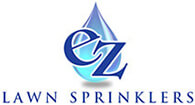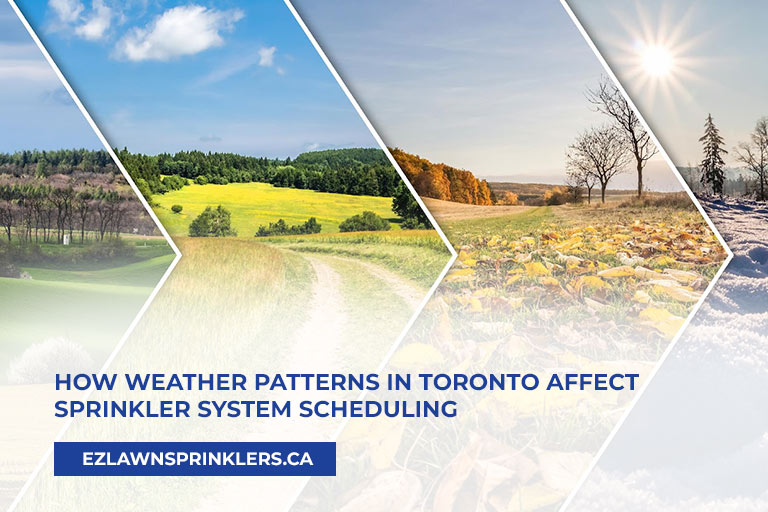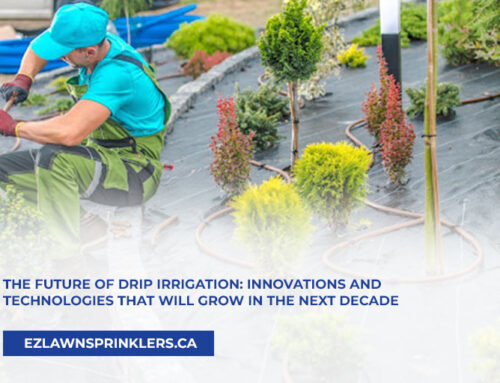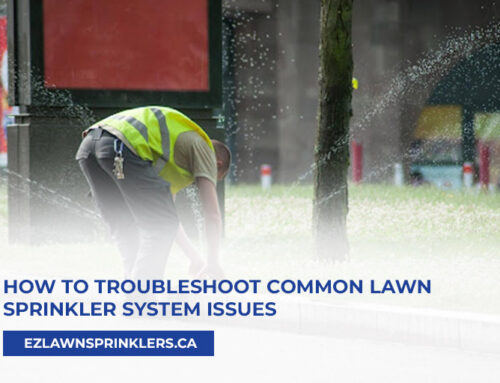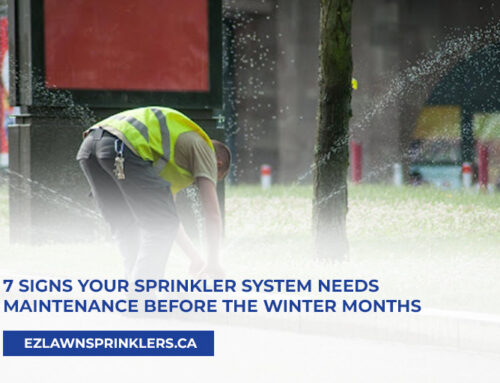Efficient irrigation management hinges on the precise delivery of water, ensuring it reaches crops at the right time and in the right quantity. This delicate balance is guided by various weather factors, including temperature, humidity, wind speed, and solar radiation, as highlighted in a study.
In a city like Toronto, where weather patterns can be unpredictable and vary dramatically throughout the year, understanding how these elements influence sprinkler system scheduling is crucial. Learn how Toronto’s unique climate impacts irrigation timing and offers insights into optimizing your sprinkler system for maximum efficiency.
Understanding Toronto’s Weather Patterns
Toronto’s weather is characterized by 4 distinct seasons, each presenting unique challenges and opportunities for irrigation. Recognizing these patterns is essential for effectively scheduling your sprinkler system.
Seasonal Climate Variations
Toronto experiences a wide range of seasonal changes, from the blooming springs to the sweltering summers, crisp falls, and harsh winters.
- During spring, temperatures gradually rise, increasing the need for consistent watering to support new growth.
- In summer, the heat intensifies, leading to higher evaporation rates and requiring more frequent watering.
- Fall sees a drop in temperatures and often more rainfall, reducing the need for supplemental irrigation.
- Winter, with its freezing temperatures, halts irrigation altogether, necessitating the shutdown and winterization of sprinkler systems.
Rainfall Distribution
Toronto’s rainfall is unevenly distributed throughout the year, with the most significant amounts typically occurring in the late spring and early summer. On average, the city receives about 831 mm (32.7 inches) of precipitation annually, but monthly totals can vary widely.
For instance, May and June often bring heavy rain, which can naturally reduce the need for sprinkler use. However, in late summer and early fall, rainfall tends to taper off, making supplemental watering more necessary.
Understanding this distribution allows homeowners and property managers to adjust their sprinkler schedules to avoid overwatering during wet months and ensure adequate hydration during drier periods.
Temperature Fluctuations
Toronto’s temperature can swing dramatically between seasons, impacting soil moisture and evaporation rates. During the summer, average highs can reach around 26°C (79°F), leading to rapid moisture loss from the soil.
In contrast, spring and fall see milder temperatures, reducing evaporation and thus the frequency of watering needed. Winter’s freezing temperatures not only stop the need for irrigation but also require careful management to prevent damage to sprinkler systems.
The Impact of Weather Patterns on Sprinkler System Scheduling
Toronto’s varied weather patterns necessitate a flexible and responsive approach to sprinkler system scheduling. By adapting to seasonal changes, rainfall variations, and temperature extremes, you can ensure your landscape receives the right amount of water, no more and no less.
Adjusting for Seasonal Changes
Each season in Toronto brings different irrigation needs.
- In spring, as plants emerge from dormancy and growth accelerates, your sprinkler system should be programmed to water more frequently, but with moderate amounts to encourage deep root growth.
- As summer arrives and temperatures rise, the frequency and duration of watering sessions should increase to compensate for higher evaporation rates and more intense sunlight.
- During fall, as temperatures cool and the growing season winds down, it’s crucial to gradually reduce watering to prevent over-saturation and prepare plants for winter dormancy.
- Winter requires shutting down the system entirely to avoid freezing damage, ensuring that pipes and sprinkler heads are drained and protected.
Responding to Rainfall Variations
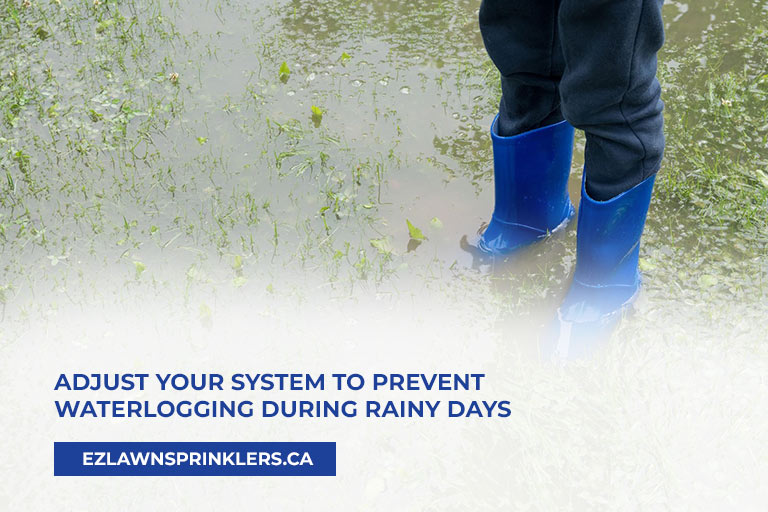
Toronto’s irregular rainfall distribution means that your sprinkler system must be adaptable to changing conditions. Using modern tech that can adjust the watering schedule based on actual rainfall can prevent overwatering and save water.
For example, if a heavy rainstorm occurs, the system should automatically skip the next scheduled watering to avoid waterlogging the soil. Conversely, during periods of below-average rainfall, the system can increase the frequency of watering to make up for the deficit.
This responsiveness not only conserves water but also promotes healthier plant growth by maintaining optimal soil moisture levels.
Adapting to Temperature Extremes
Temperature extremes in Toronto, particularly during the peak of summer and winter, significantly influence irrigation needs. During hot summer days, soil moisture evaporates quickly, necessitating more frequent watering sessions, possibly in the early morning or late evening when temperatures are lower, to minimize evaporation.
Smart sprinkler systems equipped with temperature sensors can automatically adjust watering schedules based on real-time temperature data, ensuring that plants receive adequate hydration without wasting water.
On the other hand, as temperatures drop in the fall, the system should reduce watering frequency to align with slower evaporation rates and the plants’ reduced water needs.
Tools and Technologies for Weather-Based Sprinkler Scheduling
Incorporating modern tools and technologies into your irrigation system can greatly enhance your ability to respond to Toronto’s variable weather patterns. These innovations not only simplify the scheduling process but also optimize water usage, ensuring your landscape remains healthy year-round.
- Smart Irrigation Controllers
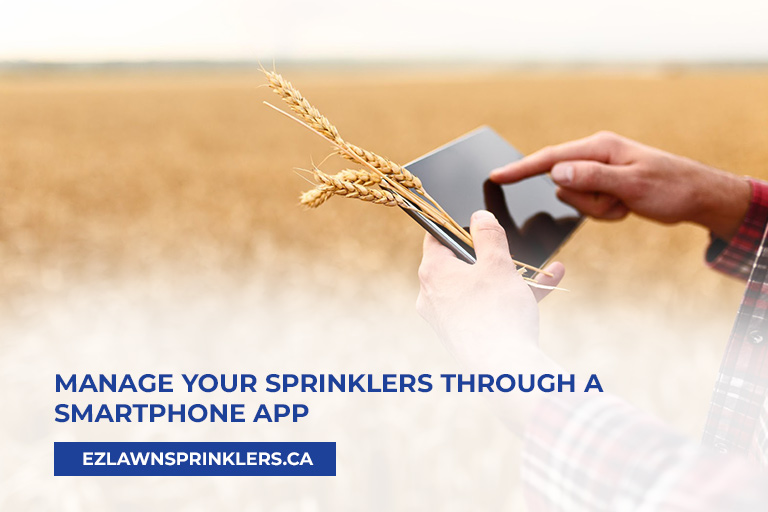
Smart irrigation controllers represent a significant advancement in sprinkler system technology. These devices automatically adjust your watering schedule based on real-time weather data, including forecasts, current conditions, and even soil moisture levels.
In Toronto, where weather can change quickly, smart controllers offer the flexibility needed to respond to unexpected rain showers or heatwaves.
Additionally, many smart controllers can be managed via smartphone apps, allowing homeowners to monitor and adjust their irrigation schedules from anywhere, ensuring optimal watering no matter the conditions.
- Integration with Local Weather Stations
Connecting your sprinkler system to local weather stations is another effective way to refine your irrigation schedule. By receiving hyper-local weather data, your system can make precise adjustments based on current conditions in your area.
This integration allows for more accurate watering, particularly in a city like Toronto, where weather can vary significantly from one neighbourhood to another.
Some advanced sprinkler systems are designed to pull data from multiple nearby weather stations, providing a comprehensive view of conditions that might affect your landscape. This technology ensures that your sprinkler system is always in sync with the actual weather, reducing water waste and promoting healthier plant growth.
- Soil Moisture Sensors
Soil moisture sensors are an essential tool for ensuring your plants receive the right amount of water without overwatering. These sensors measure the moisture content of the soil in real time, allowing your sprinkler system to water only when necessary.
In Toronto, where weather conditions can lead to both heavy rains and dry spells, soil moisture sensors help maintain the ideal moisture balance, ensuring that your plants remain hydrated without drowning.
For proper installation and integration of these sensors, consulting a professional sprinkler system installer is recommended. By working with an expert, you can create a more responsive and efficient irrigation setup that adapts to both weather patterns and the specific needs of your soil.
Ready for a Smarter Irrigation Solution?
Optimizing your sprinkler system in Toronto for the city’s unique weather patterns can transform your landscape while saving water and costs. For expert advice and top-notch installation, contact EZ Lawn Sprinklers at (416) 580-3939. Let us help you make the most of your irrigation system and enjoy a healthier, more vibrant garden year-round.
